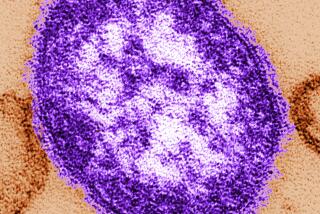As Disneyland measles outbreak spreads, O.C. bars students lacking proof of shots
- Share via
Struggling to contain a growing measles outbreak that started at Disneyland a month ago, Orange County health officials ordered about two dozen high school students without proof of immunization to stay away from campus.
The move came as officials confirmed that five Disneyland employees were diagnosed with measles, part of what officials described as the worst outbreak in California in 15 years. There are now a total of 54 patients across California as well as three other states and Mexico.
Health officials ordered the students out of class after they learned that a Huntington Beach High School student who was infected with the disease had come to class when school resumed after winter break. They said they would take the same action in other schools if measles are detected.
“If there is a case in the school and their child is not immunized, they will be removed from the school for 21 days,” said Dr. Eric Handler, the Orange County public health officer. “From an epidemiological standpoint, in order to prevent spread of the disease, this is a necessary measure.”
Orange County is home to several upscale communities where a higher than average number of parents have opted to not fully vaccinate their children because of their personal beliefs. Experts say it’s a problem when 8% or more decline vaccines that keep diseases such as measles from spreading.
In the Huntington Beach City School District, two out of seven elementary schools’ kindergarten classes exceed that number: S. A. Moffett Elementary, where 10% were exempted from vaccines for personal beliefs, and Huntington Seacliff Elementary, pegged at 11%.
A Times analysis published last year found that 9.5% of kindergartners at Capistrano Unified in south Orange County in 2013 were exempted from vaccinations because of personal beliefs; the rate was 14.8% at Santa Monica-Malibu Unified. The rate statewide that year was 3.1%.
Orange County’s move to keep unvaccinated students from classes is being watched across the state as measles immunization rates have been declining almost every year since 2002 among California’s kindergartners. Vaccines have been viewed with suspicion despite numerous scientific reports thoroughly discrediting the notion that vaccines cause autism.
“The vaccine is safe,” Handler said. “We can prevent this disease if people get vaccinated.”
But until now, many parents in this generation haven’t had to deal with being forced to keep children home if they weren’t caught up on their shots. And some public health experts say it’s time to do so again.
“Unless we do something about, you know, say, 10% of the population susceptible, we’re in for a long winter and spring,” said Dr. James Cherry, a UCLA pediatric infectious diseases research professor.
The cases could climb exponentially. Measles is so infectious — it spreads through the droplets from a sneeze or cough — that a single sick person who walks into a community of completely nonimmunized people infects 12 to 18 of them.
“If the rate of unimmunized is as high as it seems to be, you’re going to get more cases, and then you’re going to get more spread from those,” Cherry said.
The measles vaccine has been around since 1963 in the United States, but there were still major outbreaks of measles nationwide in 1976-77 and 1989-91.
In 1977, Los Angeles County health officials had faced two measles deaths, three cases of brain inflammation and numerous cases of pneumonia requiring hospitalization, according to an article in the journal Vaccine. Desperate county health officials ordered all children who had no proof of immunity to get the shot or be banned from school.
About 50,000 students were ultimately told to stay away from class because they had no proof of inoculation. Within days, “most were back at school with proof of immunity, and the number of reported measles cases dropped precipitously,” the report said.
It’s an open question whether the current measles outbreak will cause parents to reconsider decisions to avoid the measles vaccine for kids. But some are changing their minds.
A mother at Mariners Park in Newport Beach said that after her daughter Sienna was born 2 1/2 years ago, she wanted to follow an alternative vaccine schedule. The schedules published in “The Vaccine Book: Making the Right Decision for Your Child” by Dr. Robert Sears delays or eliminates certain immunizations, much to the dismay of public health officials.
“I didn’t want to flood her system with a bunch of chemicals all at once. I wanted to be informed and not trust what medical professionals said,” according to the mother, Stephanie, who asked that her last name not be used, citing concerns about her family’s privacy.
But the outbreak worries her, and she said she is going to get the vaccine to her daughter next month. “It was a hard decision,” she said.
Some parents who vaccinated their children objected to the risk posed by unvaccinated children.
“It scares me,” said Julie Angus, 40, walking her preschooler Mia, 4, and first-grader Gabriel, 6, home from William T. Newland Elementary School in the Fountain Valley School District, after hearing that 9.9% of kindergartners in 2013 had exemptions for required vaccines due to personal beliefs.
“They’re making a decision for their child that affects other children. I personally feel that if that’s your choice you should home-school your child,” Angus said.
The measles cases spread at Disneyland a week before Christmas. Experts have said the theme park was a perfect incubator because it attracts visitors from all over the world, such as places in Europe and Asia where measles is still a large problem.
Since then, the disease has continued to spread via people who were not vaccinated.
Disney officials confirmed to The Times on Tuesday that five Disneyland employees have been diagnosed with measles. Two have been vaccinated, health officials said, and the vaccination status of the other workers is still being investigated.
All Disneyland employees who could have been in contact with those five have been asked to provide vaccination records or do a blood test that shows they have built immunity to the disease.
Any employees who had not been vaccinated or could not confirm their immunity status have been asked to go on paid leave until their status could be confirmed, Disneyland officials said.
“As soon as the O.C. Health Care Agency notified us on January 7, we immediately began to communicate to our Cast to raise awareness,” Dr. Pamela Hymel, chief medical officer for Walt Disney Parks and Resorts, said in a statement. “In an abundance of caution, we also offered vaccinations and immunity tests.”
Strict measures have also been taken in San Diego County, where last week an urgent-care clinic in the suburb of La Mesa was shut down after five people arrived with the telltale rash caused by measles. Anyone with no proof of vaccination who came in contact with the people was put under a mandatory quarantine for 21 days.
Officials are urging those who suspect they are ill with measles to call their health provider first so a doctor’s office can make special arrangements to avoid infecting other people in the waiting room.
Controlling measles is difficult because patients are infectious as soon as coughing and sneezing begins but before the telltale rash appears — first on the head, then spreading to the rest of the body. Patients can be contagious four days before the rash appears and four days after. Other symptoms include fever, redness of eyes and a runny nose.
It can take seven to 21 days from exposure to the virus to onset of fever.
More to Read
Get the Latinx Files newsletter
Stories that capture the multitudes within the American Latinx community.
You may occasionally receive promotional content from the Los Angeles Times.







